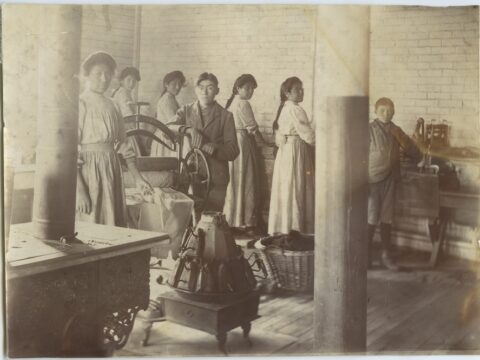What if a confidant, a lover hidden in plain sight, could share his uncensored account of Jesus roaming the Earth? This is the premise of Anthony Oliveira’s debut novel, Dayspring, a daring retelling of the Christ story narrated by Jesus’ beloved disciple.
In Oliveira’s immersive fiction, Jesus advocates for social justice, recovers from drunken adventures with friends, performs miracles at weddings and endures crucifixion. He is as divine and human as one’s first love.
Oliveira is an award-winning author and film programmer in Toronto. He also hosts The Devil’s Party, a podcast exploring Christian texts through a queer, pop culture lens.
Sherlyn Assam spoke to Oliveira about Dayspring.
SHERLYN ASSAM: One of the first things a reader notices is that Jesus’ words in the book appear in red type. Why did you decide to set them off like that?
ANTHONY OLIVEIRA: When I was a kid, there was a huge King James Bible sitting in our front parlour that had red letters for whenever Jesus spoke. There was something so mysterious and magical about that.
When I realized I wanted to flag the dialogue from Christ differently, it just seemed like a natural fit. I really wanted it to have the same effect as when you encounter it in the Bible, which feels like a lance right through the text. It pops out. That’s why we call them red-letter days, right? I wanted that lance through the book — the way it pierces you.
SA: The narrator in Dayspring, who is never named in the book, says he knows no allegiance but love. What do you mean by that?
AO: When the narrator says, “I will know no allegiance but love,” he’s expressing what I think is one of the deeper cores of Christianity, which is that love wins. It wins because it doesn’t obey the law. In many ways, that’s what the crucifixion is about. Love breaks the system. We deserve hell. That’s the idea of original sin. There’s no way to get through this life without sin. A god who was fair would make sure we were punished for that. But a god who loves is willing to break the spokes of that wheel.
More on Broadview:
SA: Jesus was viewed as a political and religious threat by the Romans during his lifetime. Do you think his teachings are interpreted as radical today?
AO: I think an encounter with the Gospels, when it is genuine and honest, is to recognize in it an extremely radical, socialist message. That’s the indisputable historical fact of these texts. You read the book of Acts, and it says, “We shared all our property.” One of the goals of this book is to recover that radicalism and to also recognize the extreme queerness of this history. That these are 13 men living in common.
SA: What was it like writing sexual scenes with Jesus, especially given homophobia in the church?
AO: I grew up in an all-boys Catholic school. I was an altar boy and in the choir, so these voices have been echoing in my head for a long time. I was nervous, but I also recognize that I’m not reinventing the wheel here. Many saints have written sex scenes about Jesus. A lot of them are in this book, like a saint who’s licking Jesus’ wounds. There are a lot of these very sensual moments in the Gospels, whether it’s Mary washing his feet or Jesus being like, “Everybody get naked! I’m going to wash your feet.” He was a very tactile person. When he heals people, he’s using his spit in their eyes.
I know there’s a certain kind of person who wants to imagine a Jesus who’s human but also alien, a “Don’t touch me” figure. To me, that seems to miss the point of the incarnation. If he was fully human, he must have had the full range of experiences we do, or it doesn’t feel like it counts. I really am taking my cues from the Gospels here, in a way the canonical Gospels are quite insistent upon. And then you have the apocryphal texts that go further, like the Mar Saba fragment, the Secret Gospel of Mark, where it’s very clear that Jesus is having a sexual relationship with the beloved disciple.
Want to read more from Broadview? Consider subscribing to one of our newsletters.
SA: What do you hope queer readers will take from the book?
AO: Many of the great Christian works of art — King James’s Bible, Michelangelo’s work — were created by queer people. They were writing the hymns and poetry, painting the art and carving the monasteries.
I wanted to say, “This could be our tradition, too,” if we were willing to scrape away the garbage that has attached itself to Christianity. If I throw out the megachurches, the bishops, the wealth and the power that have captured it so entirely, there might be something to save here.
This interview has been edited for length and clarity.
***
This story first appeared in Broadview’s June 2024 issue with the title “A God Who Loves.”
Sherlyn Assam is a Canadian freelance writer and editor based in the U.K.
















I find this interview bothersome. First, there is much controversy and questioning re the Mar Saba fragment, with different interpretations. This is not presented. Secondly, I find the reference to The King James by Bible as Christian art created by queen people to be very offensive.
Reply: in my comment, should say queer people, not queen. Sorry – autocorrect